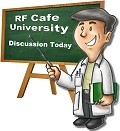Secure RFID. Or Not.
|
|
1 | 2 | 3 | 4 | 5 | 6 | 7 | 8 | 9 | 10 | 11 | 12 | 13 | 14 | 15 | 16 | 17 | 18 | 19 | 20 | 21 | 22 | 23 | 24 | 25 | 26 | 27 | 28 | 29 | 30 | 31 | 32 | 33 | 34 | 35 | 36 | 37
Security issues frequently appear in the news regarding interception of Wireless Local Area Network (WLAN) and Bluetooth device traffic, and each time they do, engineers get busy trying to plug the newly revealed holes. As with the Windows™ operating system, most of the effort tends to be reactive rather than proactive; resources are just too scarce and expensive to act otherwise. Also as with Windows™ most of the effort on the part of the miscreants tends to be directed toward the most popular, and therefore the most likely to receive ample news coverage. Attacks on the MAC OS or Linux just does not create enough of a media frenzy to make the work involved worthwhile. Radio Frequency Identification Devices (RFID) are sort of in that MAC OS and Linux category in the wireless data theft business. That is not to say there is no reason for concern. Once confined to uses in commercial shipping and maybe pet recovery implants, RFID is appearing in more and more every-day products. Wal-Mart famously announced a plan to incorporate RFID product price scanning in all their stores, both as a convenience to the shopper and as a means to more tightly track inventory and, yes, customers. Car and truck keys have had embedded RFID chips for many years now as a theft-prevention feature (Ford recently charged me $65 for a single duplicate), as well as some forms of credit/debit cards, and specially-designed access implements. Those last items, and other personal items like them, are what you should begin worrying about. A team of computer scientists Johns Hopkins University in Baltimore and RSA Laboratories in Bedford, MA, has successfully deciphered the codes of RFID-equipped keys that protect cars from theft and cards meant to prevent fraudulent gasoline purchases. They demonstrated that "an attacker with modest resources—just a few hundred dollars" of off-the-shelf equipment could pull off the crime. The stubby wands that trigger the pumps at ExxonMobil gas stations are particularly vulnerable according to a report at www.rfid-analysis.org. Inside the head of an ignition key, the transponder must convince the vehicle's computer that it has the correct 40-bit code before fuel will flow to the engine. The transponders allow ExxonMobil customers to buy gas by waving the wand in front of the pumps that use the Speedpass system. While details of the code-breaking technique and the results are not divulged, the information casts doubts on the usefulness of the Texas Instruments (TI) RFID chip used in the anti-theft keys and the gas pump wands. The researchers assert, "It's very important to ensure that we get security right in wireless devices from the very start," and insist the theft is preventable by using a larger number of bits. They suggest the de facto standard of 128 bits. Surely such notoriety has gotten the attention of TI by now.
As can be seen in the pictures on the website, codes were ascertained merely by trying every possible code until the correct one is found. Intercepting the code is as simple as standing or sitting next to a person carrying the RFID implement long enough to run through as many code tries as necessary. The next time you are sitting in an airport with someone typing busily away on his laptop, he might just be stealing your SUV key code or preparing for a few free trips to the gas station on your account. Now, 2^40 is a pretty big number, and a lot of trials, but it does not take all that long for a computer to crank through them. Besides, there's a 50-50 chance that the thief will only have to try 2^39 of them. |
 "
"